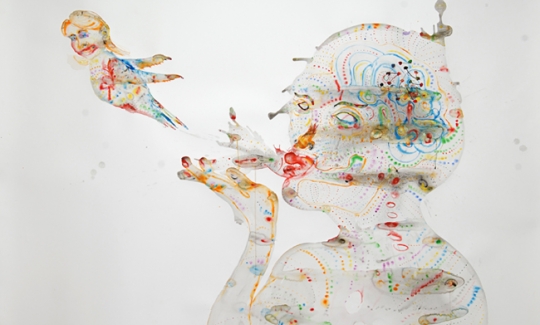Emanuel Faytchevitz: Scattering Former Love
Saturday, 24.01.09
Saturday, 20.06.09
More info:
04-6030800Curator: Tal Yahas
The works featured in this exhibition were inspired by the world of medical imaging, which uses computerized technologies to scan and map out the body. The scanning process invades the flesh and produces an abstraction of the human body, disassembling and reassembling it as a collection of data. These digital images - ranging from the ultrasound imaging of fetuses to CT studies of corpses and mummies - accompany people throughout their lives, from the womb to the grave. Faytchevitz is concerned with states in which man experiences his existence and body as a flat image and as a virtual, alienating entity. The computerized processing of the body, which renders it immaterial, finally leads to the loss of its human dimension.
In recent years, Faytchevitz has mainly exhibited bodies of work consisting of watercolor paintings on paper. The power of his works is born of the tension between the delicate, light-hued, transparent watercolors and the dark themes with which he charges them. These include passionate scenes involving force, violence and explicit sexuality inspired by currents events, kabbalistic myths, Japanese pornography and more. The first paintings in the current series were paintings of skulls and fetuses, in which medical imaging serves as the primary aesthetic reference. These body parts hover upon the white page, and are decorated with colorful dots that seem to allude to the "mapping" of the "scanned" body part. Due to the arbitrary distribution of these dots, they are transformed into an excessive, purposeless ornament - like jewelry adorning a series of ghosts. As this series evolved, Faytchevitz applied the same aesthetic to various portraits and narrative scenes. It seems that in these works, the figures have internalized the estranged digital subjectivity that has been violently imposed upon them, so that they appear monstrous and disconnected - devoid of any material, emotional or moral anchor.
Nevertheless, it seems that Faytchevitz's works do not simply point to subjective experiences of alienation and estrangement; rather, their very essence opposes itself to such experiences. The manual reappropriation of the digital images, whose high-tech quality is captured in the low-tech medium of watercolors, allows for a small moment of grace: imbued with compassion, the unsteady gestures of the painters' hand are still able to emblematize the human spirit.

